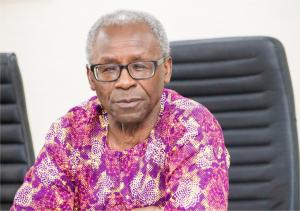Nigeria will get adequate COVID-19 vaccines-Professor Tomori
Abuja, 1 April 2021 - The COVID-19 outbreak and response has been accompanied by a massive infodemic. Professor Oyewale Tomori, a former WHO regional virologist weighs in on the efficacy of COVID-19 vaccines currently being produced and distributed worldwide and also assures of availability. He is fondly remembered for his role in championing poliovirus eradication efforts in Nigeria. Presently, the government enlists his support on COVID-19 response as an advisor to the Minister of Health. With COVID-19 vaccinations underway, Professor Tomori gives his insight on vaccine access and efficacy.
I am confident that all African countries will eventually get the vaccines they need. Organizations and entities are working hard to ensure we reach 40% herd immunity by the end of this year. These mechanisms, particularly COVAX, the vaccine distribution scheme being led by the World Health Organization (WHO), GAVI, the Vaccine Alliance and the Coalition for Epidemic Preparedness Innovations (CEPI).
The COVAX initiative, which aims to rapidly and fairly distribute a diverse portfolio of vaccines to African countries has been widely welcomed. Today, Africa is assured of enough vaccine doses to cover at least 20% of the population in participating countries.
Cabo Verde, Rwanda, South Africa and Tunisia have already received about 320 000 doses of the Pfizer-BioNTech vaccine. Another batch of COVID-19 vaccines will be available to countries, including Nigeria, to vaccinate - in order of priority - health workers and other vulnerable groups in the first half of 2021. Nigeria already received 3.9 million doses of AstraZeneca vaccine on the 02nd of March 2021.
Individual countries are already securing vaccines directly from manufacturers; Senegal and Guinea in West Africa, for example. The African Union is also working non-stop and has secured 670 million vaccine doses for the continent, all of which will be distributed in 2021 and 2022, with financial backing guaranteed by the African Export-Import Bank.
But just how effective are vaccines and which one is safest for Nigeria?
Well, Nigeria is already expecting 16 million doses of the Oxford-AstraZeneca vaccine. WHO approved and gave an Emergency Use Listing (EUL), to the two versions of Oxford/Astrazeneca. Nigeria has not recorded any cases of the 501Y.V2 variant that was first identified in South Africa.
It’s important not to conclude yet, regarding the efficacy of Oxford-AstraZeneca against the 501Y.V2 variant. WHO Strategic Advisory Group of Experts on Immunization (SAGE) has reviewed all available data on the performance of the vaccine in the settings of variants of concern and recommended the use of AstraZeneca COVID-19 vaccine, even if the virus variants are present in a country. Results from studies are for now ‘inconclusive, albeit (the vaccine) demonstrating low efficacy against mild and moderate disease, and that the study did not address other important issues like efficacy against severe disease, hospitalization.’
The initial South African study tested the vaccine against the new variant involved only two thousand people within a narrow age range. South Africa is now expanding the trial to include a hundred people. The outcome of the new study will provide important answers and perspectives to the use of the vaccine against the new 501Y.V2 variant.
As of 28 March 2021, 535million doses of covid-19 vaccines have been administered worldwide. For the same period, Nigeria administered more than 500,00 doses of the AstraZeneca vaccines.
Yes, there have been a few reports of mild side effects, but they don’t appear to last. More importantly, there is a measurable decline in the number of reported cases in countries like the UK where a large number of people have been vaccinated. However, while the COVID-19 vaccines have proven to be safe, the full duration of acquired immunity is still under study.
Though some are largely uninformed about taking the vaccine, it is advisable that people take it. This attitude (of vaccine boycott) set Nigeria back severely during the polio epidemic days. COVID-19 virus is likely to be with us for a long time, and since one cannot be immune from exposure to asymptomatic individuals - especially as the majority of Nigerians are not properly complying with the non-pharmaceutical interventions like wearing face masks, avoiding large gatherings, washing hands and keeping physical distance, the safest bet is to get the vaccine.
Not all the approved vaccines have been shown to protect against exposure or even infection, but they will protect from the infection progressing to full-blown disease. Since nobody can predict the outcome of the infection, the best action will be to get vaccinated. Recovery from the disease may be accompanied by prolonged unfavorable side effects from general debility and inability to regain a sense of taste and smell. Some people recovering from the disease have not gained or returned to full health months after recovery. So one must get vaccinated as soon as vaccines are available.
As a nation, we need to unite and act with one objective to effectively control the spread of the virus. We need to learn from the past and improve our preparedness and response for existing and recurring plagues. New epidemics of unknown diseases will emerge in the future, and Nigeria must be prepared to do better than she has done with COVID-19.
We must take the challenges and failures this pandemic has brought as opportunities to re-evaluate and re-fashion healthcare delivery in Nigeria.
Technical Contact:
Dr Jean Baptiste, Anne Eudes. Email: jeana [at] who.int (jeana[at]who[dot]int); Tel: +234 813 173 6281



